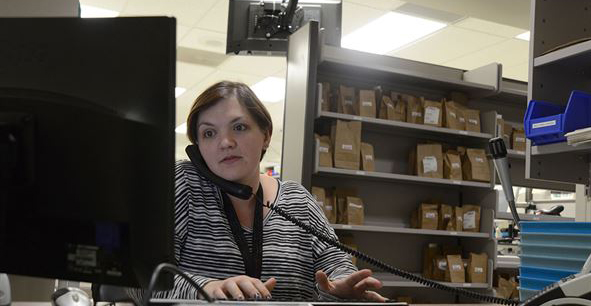
(Photo: USAF/Christopher R. Morales)
Update – June 8: Governor Brown and the California Legislature announced a budget deal that would include the proposed online-only community college discussed here.
Update – May 11: The California Community Colleges have added a second career pathway for the proposed online community college. An IT Support pathway was announced with support from the technology industry and a labor union. More info in the press announcement.
California's health care providers have a workforce challenge. The state is going to need 11,000 medical coders between now and 2024—that's about 1,600 job openings a year.
The proposed California online community college has announced its first partnership to establish a program pathway in the health care industry to meet needs like more coders.
The California Community Colleges Chancellor's Office and the Service Employees International Union-United Healthcare West & Joint Employer Education Fund met with reporters Tuesday to discuss the agreement.
The statewide online community college has been proposed by Governor Brown to help California's stranded workers, those who lack job credentials and skills because they are unable to attend colleges because of family and work responsibilities.
If approved by the Legislature this summer, the college is expected to be activated by 2019.
Medical coders start at $30 per hour and can make as much as $50 per hour. Their task includes reviewing medical charts and assigning codes for insurance billing.
“These are attractive jobs to enter the health care industry,” said Rebecca Hanson of the SEIU UHW-West & Joint Employer Education Fund.
Lorraine Maisonet of Elk Grove, California was on the conference call. She works for Dignity Health and commutes two hours to work every day. She doesn't have time to go to school but indicated that an online college would let her learn at her own speed when she could.
Alma Hernandez is the executive director of SEIU California, which represents more than 700,000 members. She said that many workers are stuck in dead-end jobs and don't have access to the education opportunities that are already available. She also pointed out that the for-profit colleges that offer similar certificate programs are expensive and often result in workers being in debt.
“This is responding to the needs of California workers,” she said.
Community Colleges Chancellor Eloy Ortiz Oakley indicated that the system is working on other pathways as the system focuses on how to help California workers improve their economic mobility and rebuild the state's middle class.
The coding curriculum normally would take four to eight months to complete, taking into account a competency based system like the one proposed will allow workers to be trained at their own speed.
The certification will be honored by the American Health Information Management Association (AHIMA) and AAPC.
It is significant that the first pathway is a partnership with a large labor organization. Some faculty unions have expressed opposition to the Governor's proposal for a statewide online community college.
Chancellor Oakley emphasized that the new online college will partner with union faculty and staff.
There are millions of workers like Lorraine Maisonet and Angel Espinosa—a fast food worker in Tracy—who would like to upgrade their skills to find better jobs and improve their quality of life but simply don't have the time to go to a traditional campus.
As Espinosa told reporters Tuesday, “If I could make $30 per hour it would mean my 68-year old grandmother wouldn't have to work anymore.”

